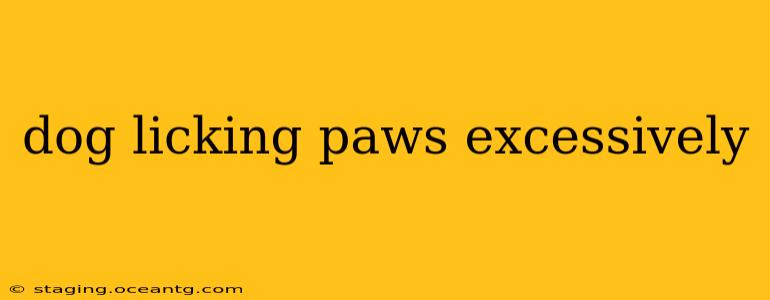Is your furry friend constantly licking their paws? Excessive paw licking in dogs is a common problem, but it's crucial to understand the underlying causes to provide the best care. This isn't just a quirky habit; it can signal a range of issues, from simple allergies to more serious medical conditions. This comprehensive guide will explore the reasons behind excessive paw licking and offer solutions to help your canine companion find relief.
Why is My Dog Licking Their Paws So Much?
This is the most frequently asked question by concerned pet owners. The reasons are varied and can range from minor irritants to significant health problems. Let's delve into some of the most common culprits.
Allergies (Environmental and Food)
Environmental allergies are a leading cause of excessive paw licking. Dogs can be allergic to pollen, grass, dust mites, mold, and even certain fabrics. These allergens can irritate the skin on their paws, causing itching and inflammation, leading to compulsive licking. Food allergies are another frequent offender. Certain proteins or ingredients in your dog's food can trigger an allergic reaction, manifesting as itchy paws and excessive licking. Identifying the specific allergen is crucial for effective treatment.
Parasites (Fleas, Ticks, Mites)
Parasites like fleas, ticks, and mites can infest your dog's paws, causing intense itching and irritation. These parasites can be microscopic, making them difficult to detect without a thorough examination. The constant licking is a desperate attempt to alleviate the discomfort caused by the infestation.
Injuries and Irritants
Minor injuries such as cuts, scrapes, or thorns embedded in the paw pads can cause pain and inflammation, leading to excessive licking. Similarly, exposure to irritants like chemicals, harsh detergents, or even salt from the roads in winter can also cause irritation and inflammation. This is particularly common in dogs that spend a lot of time outdoors.
Dry Skin
Dry skin is another common reason for paw licking. This condition is often exacerbated by environmental factors or underlying health issues. When the skin is dry, it becomes itchy and uncomfortable, leading to the dog licking their paws in an attempt to alleviate the discomfort.
Underlying Medical Conditions
In some cases, excessive paw licking can be a symptom of more serious underlying medical conditions, such as:
- Atopic dermatitis: A chronic inflammatory skin disease.
- Yeast infections: These fungal infections can thrive in warm, moist environments like paw pads.
- Bacterial infections: These can also cause significant discomfort and inflammation.
- Autoimmune diseases: These diseases can cause the immune system to attack the body's own tissues, leading to skin inflammation.
What Can I Do if My Dog is Licking Their Paws Excessively?
Addressing the issue requires a multi-pronged approach.
1. Veterinary Examination: The First Step
The most critical step is scheduling a veterinary examination. Your vet can accurately diagnose the underlying cause of the excessive paw licking through a physical examination, skin scraping, allergy testing, and potentially blood work.
2. Treatment Based on Diagnosis
Treatment will depend on the underlying cause. This could include:
- Medication: Antihistamines, corticosteroids, antibiotics, or anti-fungal medication.
- Topical treatments: Creams, ointments, or sprays to soothe irritated skin.
- Dietary changes: Switching to a hypoallergenic diet.
- Parasite treatment: Medications to eliminate fleas, ticks, and mites.
3. Home Remedies (Use with Veterinary Guidance)
Some home remedies can provide temporary relief, but they should always be used in conjunction with veterinary guidance:
- Paw balm: A paw balm can moisturize dry skin and protect the paws from irritants.
- Soaking paws in lukewarm water: This can help soothe irritated skin.
- Keeping paws clean and dry: Regular cleaning and thorough drying can prevent infections.
How Can I Prevent Excessive Paw Licking?
Prevention is key. Here are some preventative measures you can take:
- Regularly check your dog's paws: Examine them for any cuts, scrapes, or signs of irritation.
- Maintain a clean and healthy environment: Regular cleaning can help reduce exposure to allergens.
- Use a hypoallergenic shampoo and conditioner: Gentle cleaning products can help prevent dry skin and irritation.
- Provide a balanced diet: A nutritious diet can support skin health.
- Regular flea, tick, and parasite prevention: Preventative medication can help reduce the risk of infestations.
Is Excessive Paw Licking a Sign of Anxiety?
While not always the primary cause, anxiety can exacerbate paw licking. If your dog is experiencing stress or anxiety, this can manifest as compulsive behaviors, including excessive paw licking. Addressing the underlying anxiety with training, behavioral modification, or medication may be necessary. Consult your veterinarian or a veterinary behaviorist for guidance.
By understanding the various causes and implementing appropriate solutions, you can help your furry friend overcome excessive paw licking and maintain healthy, happy paws. Remember, early intervention and a collaborative approach with your veterinarian are crucial for successful treatment and prevention.
